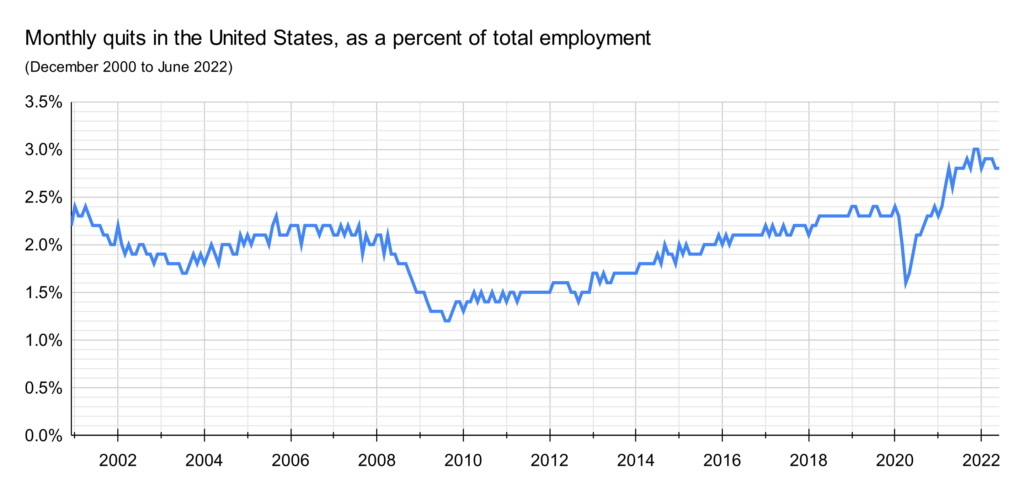Here’s a hint: there is no ‘Great Resignation’ – what is actually going on is far more interesting…
A few months back, a vibrant new phrase was coined by Anthony Klotz; ‘the Great Resignation’.[1] Like an impressive new paint job, it was fresh and easy to apply, so subsequently it was splattered across the entire internet.
However, the danger of copying your neighbour’s easy paint job before it dries, is that the paint might not be able to withstand scrutiny, and then quickly degenerates into a dry, flaked, mess.
So goes the story of the ‘Great Resignation’.
That’s quite the (lack of a) claim.
If you are reading this, then you are undoubtedly sceptical.
You will have most likely encountered the headlines with claims such as that ‘over half of Americans are considering leaving their jobs’, or that a Staffing Crisis is here, and here to stay.
This is true.
However, it was also true nearly five years ago.[2]
A huge proportion of people are always considering whether to leave their jobs!
While it is true that the proportion of people quitting their jobs has recently increased by 0.5%, it is a tiny closet compared to the fact that job openings have doubled.[3]
So there is clearly something going on there, but the story that we have been told of workers on mass sitting at the their desk for the last time, typing their insincere thanks, and walking into the golden hour does not explain everything.
Especially, when hirings have also roughly increased in line with resignations, and fewer people are unemployed than in 2018/19.[4]
The companies which are struggling to find people, are not struggling because of an unprecedented general shortage of people looking for work: something else is going on.

What else is going on.
Tech is doing well. Really, really well.
In the U.S. the growth in tech industry roles has increased by 2000%.
That is the cause of the Staffing Crisis.
Yes, professionals’ expectations and willingness to be mobile will play a role, but this is going to be affected by the demand that they are experiencing for their skills.
While there are fewer people working in music or hospitality, there are more working in scientific research and tech.[5] Given that they have found a home for their transferable skills, why would they now return to their previous industries and make up to 85% less?[6]

Why this is so cool.
The Staffing Crisis, is less a crisis, and instead an undiscussed Tsunami of ideas, innovations, and initiatives which are going to push humanity forwards.
The massive increase in tech postings, is due to us being in a great spot. Each vacancy, is part of a planned project for something new to be created or overhauled, to make lives more efficient and easier.

Rather than seeing the Staffing Crisis as a bad thing, it is a signifier of all of the innovation and digital transformation which is on the cusp of being unleashed.
One so large, that even with the doubling of the amount of people shifting into tech from other industries, supply can’t keep up with demand![7]
We are shifting from a society where people spend most of their lives in menial industries they find unfulfilling, to one where we can’t get enough of people who are pushing humanity forwards.
Even with the coming economic turbulence, and dialled back expectations, companies are still fighting over candidates and expect to grow substantially.[8]
That is brilliant.
Why this is so dangerous.

If we do not identify the right people now, the moment may pass.
Clearly, there is lots people want to do, to achieve.
But, if companies are unable to find the talent, moments can pass like lives of potential left unfulfilled.
Ideas that could really help people, like emergent medicines or innovative efficiencies could fall through the cracks.
We run the risk of killing innovation.
Wait, 'lots of demand for new innovative projects, can kill innovation', what!?!
Well, in there being such a demand for these skills, as mentioned, tech salaries have gone up substantially.
Like a gentleman bidding over a Fabergé egg, a bidding war is underway: with salaries speeding up an express lift to the peak of Mt. Everest.
What this means, is that companies will be unable to hire as many people. Meaning, the rate of digital transformation will be slowed and entrenched businesses will buy up all the labour.
Dynamic individual start-ups, with their disruptive ideas, and allowing the dynamic leaders of the future to emerge, will be priced out of the market. Leaving only large companies where the innovation of youth is often stifled until they can grind up the corporate ladder.

Resources will dictate success, not the market, not merit.
Moreover, while opportunities in tech grow, opportunities for people to get in wither.
With traditional middle-class professions, like law, developing into a bloated labour market, entrepreneurial families seeking good pay and conditions are shifting into tech: demand for courses has doubled in five years, but the capacity for teaching only has increased by 17%.[9]
What this means is that it is becoming increasingly harder to obtain tech skills.
As with more competition, those from disadvantaged backgrounds are going to find it harder to make headway.
Which for an industry which has thrived on new perspectives and innovative thinking to produce new concepts and systems, its very success may be its undoing. As it becomes the home of the elite, groomed into it, not out of passion but the financial rewards.
How we can avert all of this.
We must keep an open mind to unconventional candidates.
When polled, the single biggest issue employers say they have is finding people with the right skills for a role.[10] But as established, this is not going to resolve itself: there is simply more demand than there are people.
So either companies can continue this race to the top, kill the start-up sector in the process and eat into their potential team sizes, or they can look to the sizable, emergent groups of people transitioning into the space.
We know from our work at Sigma, that non-conventional candidates often outperform their established peers when assessed unbiasedly on their skills, not the perception of them. It is simply our perception of them which is holding them back.
Employers say they can’t find skilful candidates, but all the research suggests that they exist, and that broadening our mind to these unusual applicants, maintains high standards, solves the Staffing Crisis, broadens team backgrounds and innovative potential, as well as not costing employers unstainable salaries to do so.
So the options are simple.
Either, we use unbiased hiring tools: to lower costs, provider wider opportunity, accelerate innovation, and enlarge the tech pool.
Or, we accept the stagnant Staffing Crisis and pump more money into hiring increasingly less impressive candidates.
I know what I would choose.
[1] Mercer (2021) ‘the truth about what employees want: a guide to navigating the hyper-competitive U.S. labor market’, p. 3. Available at: https://www.mercer.us/content/dam/mercer/attachments/private/us-2021-inside-employees-minds-report.pdf.
[2] Singer, N. (2019) ‘The Hard Part of Computer Science? Getting Into Class’, New York Times, 24th January. Available at: https://www.bbc.com/worklife/article/20211214-great-resignation-into-great-reshuffle (Accessed: 7 August 2020).
[3] Chrsitain, A. (2021) ‘How the Great Resignation is turning into the Great Reshuffle’, BBC, 14th December. Available at: https://www.bbc.com/worklife/article/20211214-great-resignation-into-great-reshuffle (Accessed: 7 August 2020).; Palmer-Derrien, S. (2021) ‘The Great Resignation drives tech wages higher: Can startups keep up?’, Smart Company, 11th November. Available at: https://www.smartcompany.com.au/people-human-resources/human-resources/great-resignation-tech-wages-startups/ (Accessed: 7August 2020).
[4] Tung, L. (2022) ‘First the Great Resignation, now tech workers are worrying about losing their jobs’, ZD Net, 4th August. Available at: https://www.zdnet.com/education/professional-development/first-the-great-resignation-now-tech-workers-are-worrying-about-losing-their-jobs/ (Accessed: 7 August 2020).
[5] Wall Street Journal (2021) The Great Resignation, Explained in One Chart. Available at: https://www.youtube.com/watch?v=J2retN4TEA0 (accessed: 7 August 2022).;
[6] Flynn, J. (2022) ‘Tech Industry Statistics [2022]: The State Of The U.S. Tech Industry’, Zippa, 1st February. Available at: https://www.zippia.com/advice/tech-industry-statistics/
https://www.businessinsider.com/why-everyone-is-quitting-great-resignation-psychologist-pandemic-rethink-life-2021-10?r=US&IR=T (Accessed: 7 August 2022).
[7] Umoh, R. (2018) ‘Nearly 40 percent of employees are so burned out they want to quit—and work-life balance isn’t to blame’, CNBC, 19th November. Available at: https:www.cnbc.com/2018/11/19/why-nearly-40-percent-of-employees-are-so-burned-out-they-want-to-quit.html (Accessed: 7 August 2022).
[8] Economic Policy Institute (2020) Job Openings and Labor Turnover Survey. Available at: https://www.epi.org/indicators/jolts/ (accessed: 7 August 2022).
[9] Ibid.; Trading Economics (2022) United States Unemployment Rate. Available at: https://tradingeconomics.com/united-states/unemployment-rat (accessed: 7 August 2022).;
[10] Kaplan, J. (2021) ‘The psychologist who coined the phrase “Great Resignation” reveals how he saw it coming and where he sees it going’, Business Insider, 2nd October. Available at:
https://www.businessinsider.com/why-everyone-is-quitting-great-resignation-psychologist-pandemic-rethink-life-2021-10?r=US&IR=T (Accessed: 7 August 2022).




